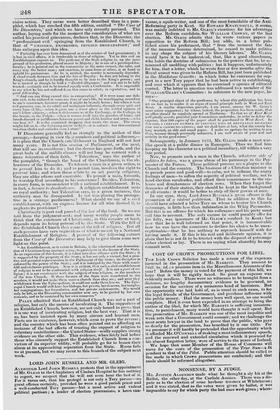LORD JOHN RUSSELL AND MR. GLEIG.
ALTHOUGH Lord JOHN RUSSELL protests that in the appointment of Mr. GLEIG to the Chaplaincy of Chelsea Hospital lie has nothing to regret, we suspect that he will not soon hear time last of it. For it turns out, that his protege is not only a Tory parson—no great offence certainly, provided he were a good parish priest and a well-conducted Tory parson—but a most active and violent political partisan ; a leader of election processions, a keen can- vasser, a squib-writer, and one of the most formidable of the Anti- Reforming party in Kent. Sir EDWARD ENATCHBULL, it seems, was mainly indebted to Mr. GLEIG'S exertions for his advantage over the Reform candidate, Sir WILLIAM COSWAY, at the last election. Mr. GLEIG admits that he wrote various papers in
opposition to the Reform Bill; but adds, in a letter pub. lished since his preferment, that " from the moment time fate
of the measure became determined, he ceased to make politics in any shape the subject of his literary labours." Mr. GLEIG
would have it to be understood, that, like a good churchman, who holds the doctrine of submission to the powers that be, he re- nounced all meddling with politics : but it happens, unfortunately
for him, that a letter, which he wrote four or five months after the Royal assent was given to the Reform Bill, has just been published in the Maidstone Gazette; in which letter he canvasses for sup- port to a new Tory paper that he had been active in establishing, and over which it appears that he exercised a species of editorial control. The letter in question was addressed to a member of Sir WILLIAMGEARYS Committee : in reference to the new paper, he says- " One principal object of the gentlemen by whom this publication has been set on foot is, to render it an organ of sound principle both in West and East Kent. A similar disposition prevails, I am aware, among Sir \V. Geary's most active supporters; by whom, indeed, the proposition has been made, that an office should be regularly opened at Maidstone. To that we of East Kent will gladly accede, provided your Committees undertake, in order to defray the expense, that 300 copies of the paper shall be purchased in West Kent. In this case, A CERTAIN NUMBER OF COLUMNS WILL BE REGULARLY RESERVED FOR YOUR COMMUNICATIONS; and we shall have at last, what the county has long wanted, an able and sound paper. I make no apology for writing to you thus, because though personally unknown, I am well aware of your zeal and activity in the good cause."
Subsequently, in January 1833, Mr. GLEIG made a most war- like speech at a public dinner in Ramsgate. Thus we find him keeping up his character as a political incendiary, till within a very late period.
Now, to promote such a man in the Church, whatever side of politics he takes, was a gross abuse of his patronage in the Pay-
master of the Forces. These political parsons are a plague to the Church and the country. The business of a Christian minister is to preach peace and good-will—to calm, not to inflame the angry feelings of men—to soften time asperity of political warfare, not to head election cavalcades, and afford their countenance to the vio- lence and drunkenness of election rows. When they forget time decencies of their station, they should be kept in the background at all events: it would be better to strip off their gowns at once.
In our eyes, then, Lord JOHN RUSSELL'S great offence is the promotion of a violent politician. That in addition to this lie should have selected a bitter Tory on whom to bestow his Church patronage, is little less than infatuation in the Whig Paymaster. But this is an offence for which his colleagues and his party must call him to account. The only excuse be could possibly offer for his folly, was ignorance of Mr. GLEIS'S conduct in Kent; but now that he is well informed on that point, it is inconceivable how he can have time assurance to declare his choice to be unex- ceptionable—that he has nothing to reproach himnself with for having made it. If this is his real and deliberate opinion, it is plain that he is not fit to be trusted with time disposal of patronage either clerical or lay. There is no saying what absurdity he may commit next.




















 Previous page
Previous page